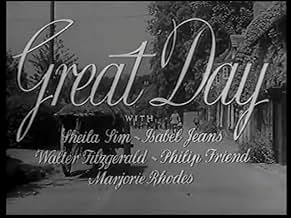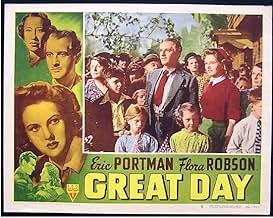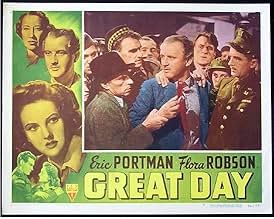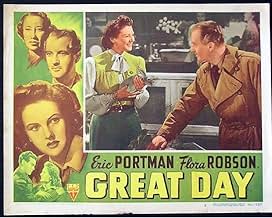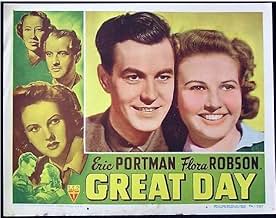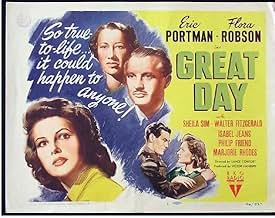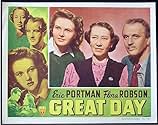An impending Eleanor Roosevelt visit causes bustle in an English village, while the Ellis family struggles with private problems.An impending Eleanor Roosevelt visit causes bustle in an English village, while the Ellis family struggles with private problems.An impending Eleanor Roosevelt visit causes bustle in an English village, while the Ellis family struggles with private problems.
Featured reviews
This is both a delightful and a curious film of the effects of World War Two on rural British life in a small town setting. Throughout the war the women of the town have been supplying woolen goods to Allied Armies in order to do their bit for the war effort, even to the Russians defending Stalingrad. The film's delight comes from watching the womenfolk prepare for a visit from Eleanor Roosevelt, the American First Lady. The excitements from the anticipation of her visit surrounds the town and its activities. The curious side of the film has to do with the realization that the town never really changed very much during the war. Yes, there are fewer men, but the town still seems untouched by the horror of war. Small and petty problems are the order of the day, and ancient likes and dislikes rule the gossip. But did they not always? The subplot of Margaret Ellis's (by Sheila Sim)choice for a husband is a reflection of business as usual for small town activity. Indeed, getting in the wool is almost as important as the First Lady's visit. In one sense, the movie confirms that the British role in World War Two was indeed fitting and normal. The suspense of how the town will take to Mrs. Roosevelt and how she will view the town dominates the action. Alas, the great day is coming!
From the title, and from the brief plot summary, you might expect this to be another wartime morale booster. If it is, it is a strange one indeed.
The story is set in an English village preparing for a visit from Eleanor Roosevelt. So you might expect a celebratory story about a hard pressed but noble people. If so, you would be wrong.
Far from being noble, some of the village women are petty, gossipy, and borderline vicious. Many of course are not, but they are portrayed as normal, not noble. The story centers on the Ellis family, who have apparently moved to the village after failing elsewhere. The father, John Ellis (quite effectively portrayed by Eric Portman) is a failure in life, hanging on to his one moment of glory as an Army Captain in World War I. His wife, Flora Robson in another great performance, is long-suffering and supportive, and our hearts go out to her. Their daughter, Shelia Sim, must choose between two men: one an exciting young man her age and an older but settled man. What makes the decision difficult for her is that she has had too much of going without or just barely getting by so that she is strongly drawn security offered by the older man.
I find the remark of another viewer about obvious sets odd. Though there are some scenes like this, I found the black and white outdoor scenes quite impressive and striking. Even some scenes, such as two men talking in a field, that could have been filmed on a set were actually filmed outdoors. I was especially struck by the scenes where the father wanders the country at night, emotionally if not physically lost, while his daughter searches for him.
The movie does end on a triumphant note with Mrs. Roosevelt's visit, but if you want to see this as propaganda I guess the message would be that even these flawed people are worthwhile. For me this film was a well made, well written, well acted, interesting and moving character study.
The story is set in an English village preparing for a visit from Eleanor Roosevelt. So you might expect a celebratory story about a hard pressed but noble people. If so, you would be wrong.
Far from being noble, some of the village women are petty, gossipy, and borderline vicious. Many of course are not, but they are portrayed as normal, not noble. The story centers on the Ellis family, who have apparently moved to the village after failing elsewhere. The father, John Ellis (quite effectively portrayed by Eric Portman) is a failure in life, hanging on to his one moment of glory as an Army Captain in World War I. His wife, Flora Robson in another great performance, is long-suffering and supportive, and our hearts go out to her. Their daughter, Shelia Sim, must choose between two men: one an exciting young man her age and an older but settled man. What makes the decision difficult for her is that she has had too much of going without or just barely getting by so that she is strongly drawn security offered by the older man.
I find the remark of another viewer about obvious sets odd. Though there are some scenes like this, I found the black and white outdoor scenes quite impressive and striking. Even some scenes, such as two men talking in a field, that could have been filmed on a set were actually filmed outdoors. I was especially struck by the scenes where the father wanders the country at night, emotionally if not physically lost, while his daughter searches for him.
The movie does end on a triumphant note with Mrs. Roosevelt's visit, but if you want to see this as propaganda I guess the message would be that even these flawed people are worthwhile. For me this film was a well made, well written, well acted, interesting and moving character study.
Curious title for this film.
From 1945, the film takes place in an English village, Denley, where it is announced that Eleanor Roosevelt will be visiting the next day. She will be observing wartime efforts by the Women's Institute, a program that prepares and sends products to the troops.
The focus is on one family, the Ellis'. The matriarch, Liz (Flora Robson) is a valuable program member. Her husband, Captain Ellis (Eric Portman) is a veteran living in his past glory and spending money they don't have on liquor. Liz has cut off his credit at the local pub so he spends time borrowing or cadging drinks.
Their daughter, Margaret, is planning to marry an older landlord but is really in love with a soldier (Philip Friend). She wants security. Philip's sister is nasty and bitter, opposed to the engagement.
In the midst of the preparations, Captain Ellis is arrested for trying to steal money.
While the film does show the excitement and preparations for Mrs. Roosevelt's arrival, it seems really to be the story of the dysfunction in the Ellis household. This is perhaps an attempt to show, through Liz Ellis, the coping mechanisms and hard work of the village women.
Liz consoles her daughter and is strong for her husband. All the while, she works for the program and makes a new dress for the child who will present flowers to Mrs. Roosevelt. Robson gives a wonderful performance, and Portman is wonderful as a disillusioned soldier who feels the world has left him behind.
The final scene is lovely and uplifting. The film is dedicated to the Women's Institute.
Some trivia: Sheila Sim, the pretty ingenue, was married to Sir Richard Attenborough for 69 years and distinguished herself in several films. Sadly, part of their family was lost in the tsunami that hit Thailand.
From 1945, the film takes place in an English village, Denley, where it is announced that Eleanor Roosevelt will be visiting the next day. She will be observing wartime efforts by the Women's Institute, a program that prepares and sends products to the troops.
The focus is on one family, the Ellis'. The matriarch, Liz (Flora Robson) is a valuable program member. Her husband, Captain Ellis (Eric Portman) is a veteran living in his past glory and spending money they don't have on liquor. Liz has cut off his credit at the local pub so he spends time borrowing or cadging drinks.
Their daughter, Margaret, is planning to marry an older landlord but is really in love with a soldier (Philip Friend). She wants security. Philip's sister is nasty and bitter, opposed to the engagement.
In the midst of the preparations, Captain Ellis is arrested for trying to steal money.
While the film does show the excitement and preparations for Mrs. Roosevelt's arrival, it seems really to be the story of the dysfunction in the Ellis household. This is perhaps an attempt to show, through Liz Ellis, the coping mechanisms and hard work of the village women.
Liz consoles her daughter and is strong for her husband. All the while, she works for the program and makes a new dress for the child who will present flowers to Mrs. Roosevelt. Robson gives a wonderful performance, and Portman is wonderful as a disillusioned soldier who feels the world has left him behind.
The final scene is lovely and uplifting. The film is dedicated to the Women's Institute.
Some trivia: Sheila Sim, the pretty ingenue, was married to Sir Richard Attenborough for 69 years and distinguished herself in several films. Sadly, part of their family was lost in the tsunami that hit Thailand.
As the film opens, we see a group of women gathering to discuss something of GREAT importance. It turns out the town will have a famous visitor, and they are determined to have everything go just right.
Lady Mott ( Isabel Jeans ) is leading up the group to spiff up the village, and to make everything perfect, and is turning everyone upside down. She is rude to everyone, and when they call her on it, all hell breaks loose. There's one scene about 20 minutes in, where she is speaking to someone outside on a country road, and you can hear quite the echo, showing that it was clearly filmed on a sound stage. The main story revolves around the Ellis family, who all have their troubles. Meg Ellis (Sheila Sim) must choose between the two men in her life. Her father has a hobby which is discovered and frowned upon by the authorities. Supporting roles for Eric Portman and Flora Robson It's all quite entertaining, for a WWII film. IMDb lists the runtime as 62 minutes for the U.S. version, but TCM must be showing the British version at 80 minutes.
This British RKO film is directed by Lance Comfort; it took another year to make it over to the U.S. after the war had ended.
Lady Mott ( Isabel Jeans ) is leading up the group to spiff up the village, and to make everything perfect, and is turning everyone upside down. She is rude to everyone, and when they call her on it, all hell breaks loose. There's one scene about 20 minutes in, where she is speaking to someone outside on a country road, and you can hear quite the echo, showing that it was clearly filmed on a sound stage. The main story revolves around the Ellis family, who all have their troubles. Meg Ellis (Sheila Sim) must choose between the two men in her life. Her father has a hobby which is discovered and frowned upon by the authorities. Supporting roles for Eric Portman and Flora Robson It's all quite entertaining, for a WWII film. IMDb lists the runtime as 62 minutes for the U.S. version, but TCM must be showing the British version at 80 minutes.
This British RKO film is directed by Lance Comfort; it took another year to make it over to the U.S. after the war had ended.
In a small English village, everyone is excited because Mrs. Roosevelt is going to visit the town.
Not that this forms much more than a background to the subplots that are going on. Much time is devoted to retired captain Eric Portman, who is nearly broke but has been putting on a front for a long time; his long-suffering wife, Flora Robson; and their daughter, Sheila Sim. Miss Sim is carrying on a love affair with a young soldier, while proposing to marry a well-to-do older man for security.
It's all very well performed, but the way the script is talking about how Mrs. Roosevelt is coming not as the First Lady, but as a wife and mother one moment, and Portman is caught stealing ten bob the next makes it difficult to maintain more coherence.
Eleanor Roosevelt was known for turning up in the most unexpected places. There's an old New Yorker cartoon of two coal miners deep underground; one of them announces "Why, it's Mrs. Roosevelt!"
Not that this forms much more than a background to the subplots that are going on. Much time is devoted to retired captain Eric Portman, who is nearly broke but has been putting on a front for a long time; his long-suffering wife, Flora Robson; and their daughter, Sheila Sim. Miss Sim is carrying on a love affair with a young soldier, while proposing to marry a well-to-do older man for security.
It's all very well performed, but the way the script is talking about how Mrs. Roosevelt is coming not as the First Lady, but as a wife and mother one moment, and Portman is caught stealing ten bob the next makes it difficult to maintain more coherence.
Eleanor Roosevelt was known for turning up in the most unexpected places. There's an old New Yorker cartoon of two coal miners deep underground; one of them announces "Why, it's Mrs. Roosevelt!"
Did you know
- TriviaAccording to an article in the April 30, 1945 edition of the Monthly Film Bulletin (a B.F.I. publication), the running time of British-released prints was one hour and 20 minutes, suggesting a considerable amount of footage was cut before its release in the U.S.
- GoofsTowards the end when Flora Robson is talking Eric Portman into seeing Eleanor Roosevelt's visit to the village, she places her hand on his right shoulder, then her hand is on the top of his arm and then back on his shoulder again.
- Quotes
John Ellis: I *will* not be bullied in my own house.
- Crazy creditsAt the very end, there is a dedication to the womens institutes, in appreciation for the contributions they have made to the war effort through their crafts.
Details
- Release date
- Country of origin
- Language
- Also known as
- Corazones intrépidos
- Filming locations
- Denham, Uxbridge, Buckinghamshire, England, UK(exteriors and surrounding area)
- Production companies
- See more company credits at IMDbPro
- Runtime
- 1h 2m(62 min)
- Color
- Aspect ratio
- 1.37 : 1
Contribute to this page
Suggest an edit or add missing content

